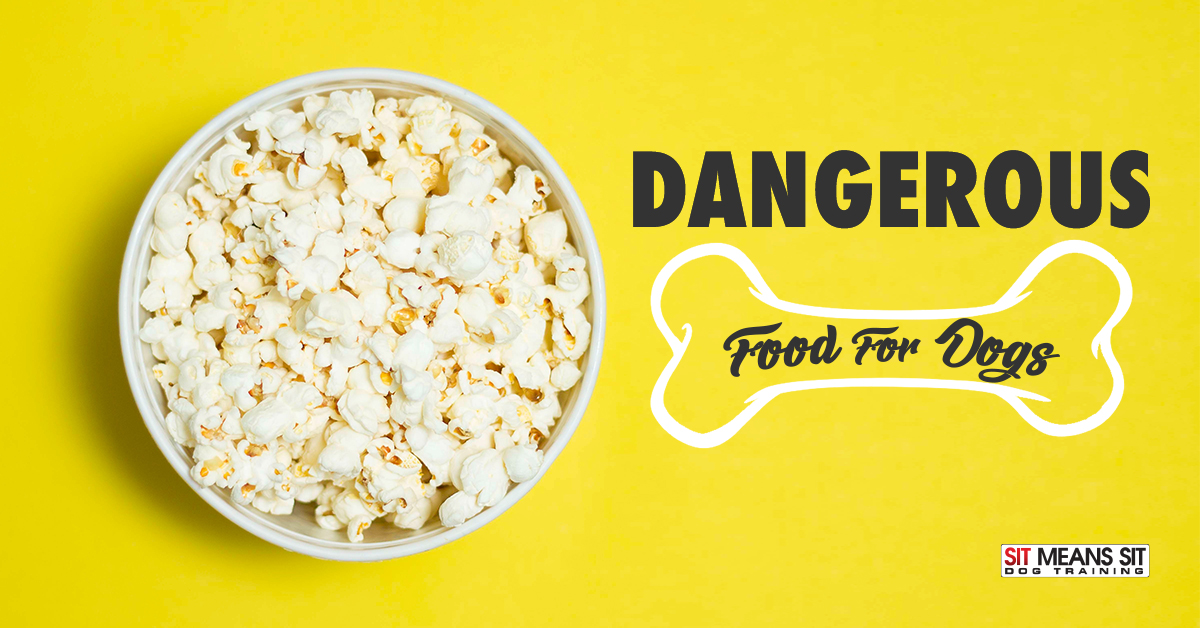
Surprisingly Dangerous Food for Dogs
If you think your dog is suffering from any form of poisoning, you can call the ASPCA Animal Poison Control Center at (888) 426-4435 24 hours a day to discuss your pet’s condition.
We love to share food with our pets, but some human food are dangerous even in small doses. Keep a pet first aid kit in case of accidents, and keep food put away in cabinets and off of counters to avoid temptation.
Dangerous Food for Dogs
The following foods are some in particular to avoid sharing with your best friend:
Popcorn
If you enjoy plain, air-popped, unsalted, unbuttered popcorn, then you might be able to share a few bites with your dog. High levels of fat and sodium on typical salted and buttered popcorn can cause dehydration and even obesity in the long term. Un-popped kernels can harm teeth and gums. Try a dog treat or some dehydrated fruit as a healthy homemade alternative.
Avocado
The skin and leaves of avocado contain persin, a toxin that can be dangerous to non-human mammals. If you avoid the skin and leaves, it is okay in some foods for dogs, but the ASPCA says that pets sensitive to persin may experience “respiratory distress, congestion, fluid accumulation around the heart, and even death.” Most dogs are not as susceptible to persin poisoning as say horses, but better to be safe than sorry with your best friend. Try some treats or grain-free dog food with added avocado or substitute avocado for pumpkin puree in some homemade recipes.
Macadamia Nuts
Although we don’t know for sure why macadamia nuts are toxic to dogs, we do know that they can cause ataxia (the loss of control of body movements), vomiting, weakness, and depression. Luckily, most dogs can recover on their own but should be monitored. Try peanut butter chews or peanut butter bacon dog treats.
Grapes
Grapes are one of the most toxic human foods to dogs. They can lead to kidney failure and even death. Grapes affect certain dogs more than others. Try giving your furry friend blueberries instead. They can even be frozen in a pupsicle treat.
Onions & Garlic
Belonging to the Allium plant family, onions and garlic are toxic whether fresh, cooked, fried, or even powdered. Allium plants damage dogs’ red blood cells, decreasing oxygen flow, and can also lead to anemia, causing organ damage. Try dog-safe yeast supplements instead.
Tomato Plants & Raw Potatoes
A green, unripe tomato or leafy green of the tomato plant contain solanine, a toxin causing gastrointestinal distress, lethargy, weakness, and confusion. Green potatoes cause the same problem. Sneak your pet some mashed potatoes on occasion, or try sweet potato jerky (homemade or store bought).
Coffee and Tea
Caffeine is extremely dangerous for dogs. According to the ASPCA, it can cause “vomiting, diarrhea, increased thirst, restlessness, and an increased heart rate” in pets. If your pet has ingested caffeine, get to the vet right away. The earlier the better when it comes to preventing more serious problems. Try carob as a healthy substitute for chocolate
Dairy
Cheese is used as a popular training treat. Although it’s not dangerous in small doses, too much cheese can cause constipation or diarrhea. In the long term, obesity and lasting gastrointestinal issues may occur over time. Contact your vet if you are concerned with your dog’s cheese intake. Try Himalayan dog chew made with hard yak’s cheese.
Sugar-Free Gum
Xylitol is often used as an alternative sweetener, but it is deadly to dogs. Ingesting it can cause life-threatening hypoglycemia. I can also be found in the following sugar-free items: peanut butter, toothpaste, and more.
Overall, some people food is safe for your pooch. The best items are lean meats, carrot sticks, and a good portion of fruits and vegetables. Plain Greek yogurt or cottage cheese can be given in small doses if your dog isn’t lactose intolerant. Know what you’re sharing with your pet and the potential side-effects.
